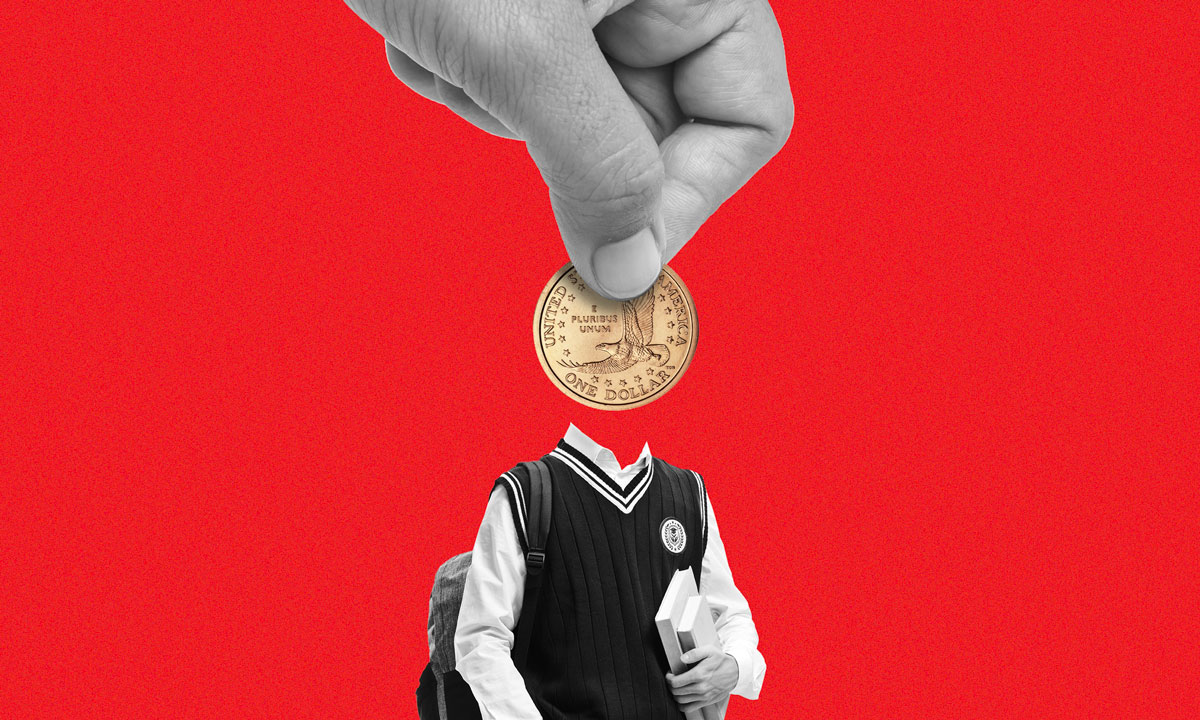Red States’ School Vouchers Mark Biggest Shift in U.S. Education in a Century
Osborne: In 14 GOP-dominated states, Education Savings Accounts will upend equal opportunity and make school quality dependent on family wealth.

Get stories like this delivered straight to your inbox. Sign up for The 74 Newsletter
Do Americans want an education system in which the quality of children’s schools depends largely on their family’s wealth?
Not likely. Yet in Republican-dominated states, that’s exactly what the future holds. This is arguably the most profound change in American education since the development of universal public education over a century ago.
Over the past five years, 14 states have passed laws creating universal vouchers, often known as Education Savings Accounts — public money families can use to pay private school tuition. All are Republican states: Alabama, Arizona, Arkansas, Florida, Iowa, Louisiana, North Carolina, Ohio, Oklahoma, Tennessee, Texas, Utah, West Virginia and Wyoming. Two more, Oklahoma and Idaho, have passed refundable tax credits available to all families.
Every family in those states is eligible, or will be within a few years, for somewhere between West Virginia’s $4,600 and Texas’s $10,500 a year per student. Counting programs limited to low-income students, more than half of all K-12 students in the U.S. now qualify for some form of voucher.
This will accelerate the process of the rich getting richer while the poor fall further behind. And now, Republicans in Congress have quietly slipped a national voucher program worth $5,000 per child into their “one big beautiful bill.”
Equal opportunity has always been a fundamental principle of public education: the idea that every child, no matter how poor, would have access to the same quality school. This has long been more an ideal than a reality, but after decades of legal battles, public funding per child is now roughly equal in poor and affluent districts.
States could preserve equal opportunity in a voucher system if parents were barred from topping up vouchers with their own money. But telling Americans they can’t help fund their child’s private school would never fly. So families will add to the value of their vouchers and buy the best education they can afford — because they love their children.
Other parents will have no money to add. Their kids will attend public schools or the least expensive private schools. And equal opportunity will fly out the window.
Vouchers will segregate students by income, since private school tuition varies widely. Hence, they will no doubt increase segregation by race as well.
Over time, as more and more people use vouchers, the education market in Republican states will stratify by income far more than it does today. It will come to resemble any other market: for housing, automobiles or anything else. The affluent will buy schools that are the equivalent of BMWs and Mercedes; the merely comfortable will choose Toyotas and Acuras; the scraping-by middle class will buy Fords and Chevrolets; and the majority, lacking spare cash, will settle for the equivalent of used cars — mostly public schools.
Meanwhile, the billions spent on vouchers will be subtracted from public school budgets, and the political constituency for public education will atrophy, leading to further cuts.
It’s obvious why vouchers appeal to people who already send their kids to private school, or would like to. But pro-voucher referenda have never won a majority. They have failed 17 times on state ballots, and three of those defeats occurred last fall, even in red states — in Kentucky, Nebraska and Colorado.
Yet, GOP funders donate millions to state legislators to support vouchers. And Republican lawmakers are heeding their wishes.
So far, studies have shown very mixed quality in private schools that accept vouchers. This is just common sense: Expensive private schools are often excellent, but cheap private schools are often worse than neighboring public schools.
Yet only one state, Louisiana, denies schools voucher money if their students perform poorly on state standardized tests. In West Virginia, voucher students who fail state tests lose their eligibility for the program. Most states demand no accountability, not even publishing test scores for schools that receive voucher money.
Private schools have the right to select their students, and some will no doubt discriminate — against gay students, transgender students, Muslim students or all of the above. State voucher laws often do not have comprehensive prohibitions against discrimination, and there are reports of bias in Wisconsin’s program, which is only for low-income students.
Finally, recent research suggests another common-sense reality: Heightened demand fueled by vouchers leads schools to raise tuition.
None of these outcomes would draw support from a majority of Americans. Yet they are happening, and they will surely deepen the growing divide between rich and poor.
Is there an alternative, other than the status quo of struggling public school systems? Indeed there is. States and school districts could reduce bureaucratic controls, empower educators and increase choice, competition and accountability for performance within the public school system, through the spread of charter schools. Cities that have done so, including New Orleans, Washington, D.C., Denver and Indianapolis, have produced some of the nation’s most rapid improvements in student performance.
Voucher advocates are right, in my opinion, to want more choice, more competition, more diversity of school models and more accountability for performance in the nation’s education system. Traditional districts are operating with a centralized, standardized model that emerged more than a century ago, which makes creating quality public schools an uphill battle, particularly in low-income areas.
I also have no problem with vouchers for low-income students who are now trapped in failing public schools. But for too long, American society has been divided — economically, socially and politically — between those fortunate enough to have earned college degrees and those for whom college was out of reach. Turning the K-12 education system into a marketplace, in which the quality of a child’s school depends upon how much their parents can afford to pay, will only widen the gaps between haves and have-nots. Sadly, 16 Republican states have taken a huge step down that path.
Get stories like these delivered straight to your inbox. Sign up for The 74 Newsletter

;)
